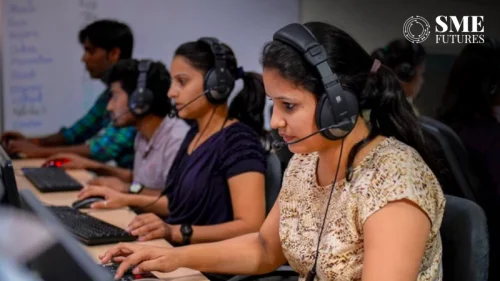Small and Medium Enterprises (SMEs) play a catalytic role in the development of the economy as they constitute a significant part of the industrial activity. It is reflected in the form of their increasing number and rising proportion in the overall product manufacturing, employment, technical innovations and promotion of entrepreneurial skills. Besides supporting employment generation activities, they also act as feeder lines for the MNCs and large corporates.
The development of this segment is extremely critical as they generate significant levels of employment across urban, semi-urban and rural areas across the country and create inclusive growth. With the Indian economy growing, the need for SMEs to raise capital is becoming increasingly critical.
The MSMEs primarily rely on bank finance for their operations, Capex and working capital requirement. As such, all public policies mainly focus on ensuring timely and adequate funding to this sector. While banks are playing a significant role in financing the MSME sector, alternative sources of finance such as Non-banking Financial Companies (NBFCs), equity financing, venture capital, seed capital etc. are increasingly gaining popularity amongst the SMEs. Therefore the demand for equity funds is growing across the SMEs irrespective of sector.
Equity capital is often a more appropriate financing instrument for high-growth-potential SMEs and Start-ups. Equity capital puts finance into the business without committing the company to inflexible repayment schedules or debt covenants that could see them lose control if results come more slowly than expected. It is also a more fitting way to reward investors prepared to take the risk of putting money into SMEs and Start-ups.
These investors don’t get regular repayments of capital and interest. However, they do a more significant share of upside than lenders would in the event of the business being a success. Their interests are aligned with the company’s. Firms typically look for equity capital to provide them with the financing they need, to expand, break into new markets and grow faster. Thus, the ability of MSMEs (especially those involving innovations and new technologies) to access alternative sources of capital like equity funds needs to be enhanced considerably to encourage and develop entrepreneurship.
Today, the equity markets and the capital markets in general, have become more robust. Capital market regulations in India are among the best in the world. As the investor base keeps widening, it becomes inexorable to provide investors with a more excellent choice of investments. To create and conserve SMEs and Start-ups, a specialized capital market segment has been put in place that can provide equity capital to SME for their growth.
With the objective described above, SEBI has come out with detailed guidelines on 18th May 2010 for the launching of SME Exchange. BSE Ltd became the first Exchange to launch its SME Platform on 13th March 2012. The objective was to provide an opportunity for the SMEs to raise the equity capital for growth and expansion and unleash the valuation of the company.
Extensive seminars were conducted across the countries along with SEBI, SME associations, Industrial association, CII, FICCI, ASSOCHAM, ICAI, ICSI and D&B to create awareness about the newly-launched platform. Many SMEs have got transformed into large corporates. Though the primary market was not doing well during the 2012 to 2015 period, BSE was able to help more than a hundred SMEs in raising funds and getting listed on its SME Platform.
As of today, there are 322 SMEs that have got listed on BSE SME Platform with funds raised to the tune of Rs 3300 cr.
India, in the last decade, has experienced a phenomenal growth in Start-ups and become the third-largest destination globally. The period was marked by the inception of thousands of start-ups, unicorns and emergence of leaders in the areas of e-commerce, robotics, edu-tech, health-tech, bio-tech and fin-tech. These start-ups with innovative ideas, needs the right channel and guidance in terms of acceleration and scaling of requisite funds. One of the most pressing growth challenges faced by policymakers is how to prepare the ground further for start-ups to grow and create meaningful impact. BSE, therefore, launched the Start-up Platform in December 2018 to offer a simple cost-effective, yet profoundly impactful mechanism that enables both start-ups and investors. As of today five start-ups got listed and raised finds to the tune of Rs. 16 cr.
Today the world is facing an unprecedented crisis caused by coronavirus pandemic resulting in large scale loss of life and severe human suffering globally. It has also resulted in a major economic turmoil, with a halt in production, a collapse in consumption and confidence and stock exchanges reacting negatively. It is being recognized that due to this crisis, various factors such as increased risk aversion, decreased liquidity, bleak prospects for economic growth etc. have a negative impact on SMEs. In such a crisis, SMEs are more vulnerable because:
a) They are less diversified in their activities
b) They have a weaker financial structure or lower capitalization
c) They have average or lower credit ratings
d) They are highly dependent on credit
e) They have fewer options for finance.
It was, therefore, felt necessary to support SMEs being the backbone of the economy. Government and RBI have taken suitable and adequate measures to ensure that in these tiring times, sufficient credit can be provided to SMEs. At the same time, many relaxation has been given in regulatory compliances.
In these tough times when India, as well as the world, is going through an unprecedented crisis because of COVID -19, exchanges can support SMEs, Start-up and MBs so that they can raise funds and keep their business running and growing. Even during the lockdown period, SMEs and Start-up keep on raising funds and getting listed one after another. This at a time when even large corporates have also postponed or cancelled their IPO owing to market condition. BSE has seen the listing of three SMEs who have raised 9.5 cr and a start-up which has raised 3.75 cr. It clearly shows the confidence of promoters and investors in BSE SME Platform.
BSE is committed to nation-building. An exchange should support and handhold the SMEs, Start-ups, intermediaries, and various stakeholders to build a vibrant ecosystem through SME Platform.
It will help in generating employment and smooth distribution of resources across the country. With the concerted efforts of all the stakeholders, SMEs and Start-up would sail through these tough times. These SMEs will become globally competitive and offer a significant contribution to India’s economic development and job creation.











